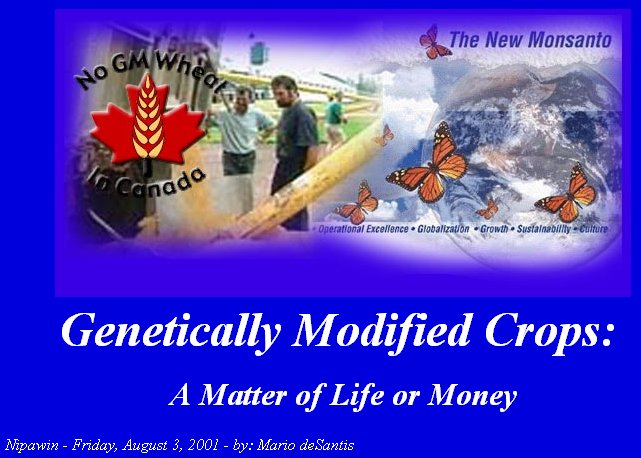Learning Stories
by
Mario deSantis
mariodesantis@hotmail.com
“I am a Canadian, free to speak without fear, free to worship in my own way, free to stand for what I think right, free to oppose what I believe wrong, and free to choose those who shall govern my country.” - -The Rt. Hon. John Diefenbaker, Canadian Bill of Rights, 1960
“The whole judicial system is at issue, it's worth more than one person.”--Serge Kujawa, Saskatchewan Crown Prosecutor, 1991
“The system is not more worth than one person's rights.”--Mario deSantis, 2002
Ensign Stories © Mario deSantis and Ensign
|
|
We expressed our disappointment to the ruling of Justice Andrew MacKay when he found farmer Percy Percy Schmeiser guilty on infringing Monsanto's intellectual property rights. Percy Schmeiser contended that Monsanto's canola seeds contaminated his crop by blowing from neighboring fields. However, Justice Andrew MacKay ruled that even if the canola did blow onto Mr. Schmeiser's field, he was not entitled to reuse it without the permission of Monsanto. Discouraged by this judgement I philosophically stated "as we progress towards a stronger globalization of our economies, so I acquire the understanding that our justice system becomes global and manufactured." A fundamental problem today is our inability to balance property rights with the communal good of our society. And this problem is becoming a matter of life and death for our farmers as they oppose the introduction of more genetically modified crops by the big transnational corporations such as Monsanto and Novartis. We know that Monsanto and Novartis are testing genetically modified crops in five provinces including Saskatchewan and P.E.I., however these companies are not disclosing the sites of these tests and Ottawa is defending the secretive positioning of these transnationals. In particular, Stephen Yarrow, a spokesperson for the Canadian Food Inspection Agency (CFIA), has stated "We are on the side of the protection of proprietary information." Farmers are concerned of the growing reluctance of consumers to accept genetically modified crops, and they are afraid that their own crops can become contaminated by the present testing conducted by Monsanto and Novartis. So on one side we have both the government and the multinationals asserting the protection of property rights, and on the other side we have farmers and consumers asserting their communal good. Who is right? Who is wrong? There is not an easy answer, a Monsanto's shareholder would claim his individual exercise of property right, while a farmer would claim his natural right to labour with no fear of having his land contaminated by genetically modified seeds. But, in order to understand the legal and financial implications of the protection of (intellectual) property rights affecting the introduction of genetically modified crops I want to quote law professor Amitai Etzioni and economist David Korten.
We have the choice to make decisions, but it is matter of choosing between life or money, and I made my choice. Some references Related social and economic articles published by Ensign Globalizing our economies and manufacturing our justice, by Mario deSantis, March 30, 2001 http://www.ftlcomm.com/ensign/desantisArticles/2001_300/desantis349/schmeiser_Monsanto.html Monsanto vs Schmeiser. The Classic David vs Goliath Struggle http://www.percyschmeiser.com/ Wheat coalition urges debate on gene modifying. Letter to PM: Concerns include contamination, trade reputation. Elizabeth Levine, National Post, August 1, 2001 http://www.nationalpost.com/home/story.html?f=/stories/20010801/633808.html Secrecy surrounds GM wheat trials in P.E.I., CBC Canada, July 27, 2001 http://cbc.ca/cgi-bin/templates/view.cgi?/news/2001/07/26/gm_wheatpei010726 Concerns raised about GM wheat crops, CBC Canada, July 22, 2001 http://cbc.ca/cgi-bin/templates/view.cgi?category=Canada&story=/news/2001/07/21/gm_foods010721 The Limits of Privacy, Amitai Etzioni, Basic Books, 1999. Section: 'Sources of Legitimacy for Privacy', page 201 http://www.gwu.edu/~ccps/etzioni/index.html The Post-Corporate World, by David Korten, 2000, Section: 'To restore the Rights of the Living,' page 187 http://iisd.ca/pcdf/post-corporate.htm |

 Amitai
Etzioni writes "All these examples make it clear that the
definition of property is itself based on socioeconomic facts and on
that which a society considers legitimate, and hence cannot be
simply an expression of some overarching universal nature. In short,
relying on private rights to serve as a legal basis for privacy
hardly gives this right the privileged standing that individualists
claim for it."
Amitai
Etzioni writes "All these examples make it clear that the
definition of property is itself based on socioeconomic facts and on
that which a society considers legitimate, and hence cannot be
simply an expression of some overarching universal nature. In short,
relying on private rights to serve as a legal basis for privacy
hardly gives this right the privileged standing that individualists
claim for it."  David
Korten writes "When the Monsanto corporation announced it was
divesting itself of most of its individual chemicals production to
concentrate on genetic engineering, its stock price doubled in
anticipation of major increases in earnings. Can the management of
the Monsanto corporation now afford to hold a new genetically
engineered product off the market until it is certain there is no
serious possibility of harmful environmental or health consequences?
David
Korten writes "When the Monsanto corporation announced it was
divesting itself of most of its individual chemicals production to
concentrate on genetic engineering, its stock price doubled in
anticipation of major increases in earnings. Can the management of
the Monsanto corporation now afford to hold a new genetically
engineered product off the market until it is certain there is no
serious possibility of harmful environmental or health consequences?